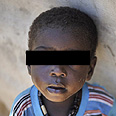
In her first seven months as United Nations envoy on sexual violence in conflict, Zainab Hawa Bangura has visited a Congolese district where rebels raped babies, and Somalia where a woman was paid $150 restitution for the rape of her 4-year-old daughter.
She met a refugee at a camp in Kenya who had been raped at gunpoint when she was eight-months-pregnant while gathering firewood and a Somali father who was fighting for justice for his daughters, aged 4 and 6, who had both been raped.
Related stories:
- War crimes court acquits Congolese warlord
- Brahimi: Damascus bombing a war crime
- UN adopts treaty to regulate global arms trade
"The stories are horrific and heartbreaking and when these survivors tell you what they endured, and continue to endure, you know that one person raped in war is one too many," said Bangura, who briefed the UN Security Council on Wednesday.
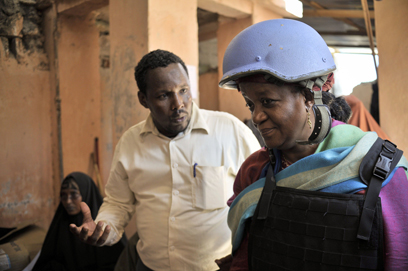
Bangura in Somalia (Photo: AFP, TOBIN JONES)
She told the 15-member council it was still largely "cost-free" to rape a woman, child or man in conflict and that this must be reversed to make it a "massive liability to commit, command or condone sexual violence in conflict."
Any future peace and ceasefire deals in conflicts like Syria and Mali must include sexual violence prevention, Bangura said.
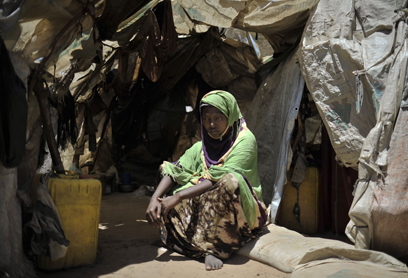
A woman in a Somalese refugee camp (Photo: AFP, TOBIN JONES)
Bangura, a former health minister of Sierra Leone, said she plans to visit Syria, Mali and South Sudan as soon as possible.
"I visited a community where last year 11 babies, between 6 and 12 months old, were raped by elements of Mai Mai Morgan," she said, referring to a rebel group in the Democratic Republic of Congo. "It is unimaginable that anyone could have committed such an atrocity."
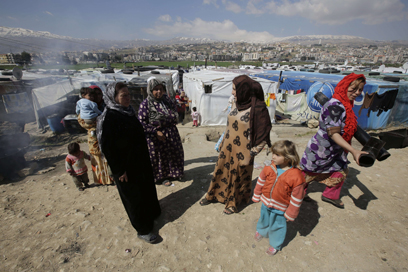
Syrian refugees in Lebanon (Photo: AFP)
Bangura also told reporters that in the same community - the Ituri district in turbulent eastern Congo on its border with Uganda - 59 children aged between 1 and 3, and 182 children between 5 and 15 years old had been raped last year.
"Under the cold light of strategy and tactics, the rationale and purpose is clear. What more effective way can there be to destroy a community than to target and devastate its children?" she told the Security Council.
War's 'least condemned crime'
Bangura said Congolese President Joseph Kabila had pledged to prosecute crimes of sexual violence more effectively and that the country's parliament had said it would establish a working group on the ssue.
A written report to the Security Council from UN Secretary-General Ban Ki-moon, based on Bangura's work, named 14 armed groups along with the Congolese army and police that it said used sexual violence in conflict.
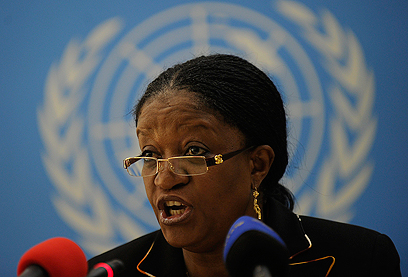
Bangura in the UN (Photo: AFP)
The report also lists groups in Central African Republic and groups and government forces in Ivory Coast, Syria and Mali.
Since January 2012, there have been 211 cases of sexual violence reported in Mali, including rape, sexual slavery, forced marriage and gang rape, according to the report.
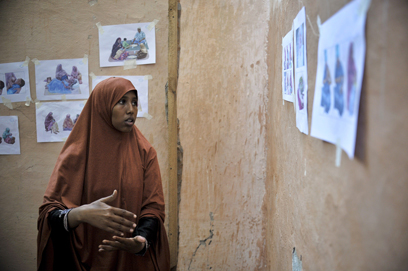
A class in infant care to women in Somalia (Photo: AFP, Tobin Jones)
"The majority of women and girls refused to report for fear of retribution and banishment by their spouses and the community," Ban's report said. "In rebel-controlled zones, rape was used as a tactic of war."
Bangura told reporters the insecurity and lack of access in Syria meant it was hard to determine the scale of the problem.
Russia's UN Ambassador Vitaly Churkin and Syrian UN Ambassador Bashar Ja'afari criticized the report for not reporting accusations of sexual violence by opposition groups during Syria's two-year-old civil war."Responsibility for sexual crimes in Syria is placed only on government forces and their supporters.
Similar crimes committed by the opposition are only obliquely referenced in spite of the presence of many such claims of them," Churkin told the council.
Bangura described sexual violence in conflict as "war's oldest and least condemned crime."
"Sexual violence has been used throughout the ages because it's such a cheap and devastating weapon," she told the Security Council. "The perpetrators must understand that there can be no hiding place, no amnesty, no safe harbour."
- Receive Ynetnews updates
directly to your desktop















